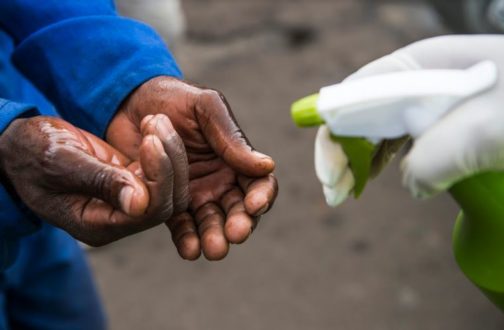
The novel coronavirus has taken over South Africans’ lives in the past month. At the beginning of the month, the country was still hosting major sporting events and big gatherings; now we’re in lockdown. Some quick research into news coverage from the past month reveals what South Africans are most afraid about, but also gives a glimmer of hope that we can fix on as we hunker down in our homes.
In the 72 top online news stories from March that I collected from IOL, News24 and TimesLive, a search for words that frequently co-occur with “Covid-19” reveals plenty about our national preoccupations at the moment. The word “fear” appeared only as the eleventh strongest association with “Covid-19”, but its presence is palpable throughout many of the other words on the list. The number one word associated with “Covid-19” in these articles was “escalation”. Experts are worried that more than a small escalation in infections could overwhelm our hospitals’ critical care units.
This has resulted in an escalation of our efforts to contain the virus: the official title of the president’s now-famous lockdown speech of March 23 was “Statement by President Cyril Ramaphosa on escalation of measures to combat Covid-19 epidemic”.
Ramaphosa was also responsible for “declaration”, the word showing the second-strongest association with “Covid-19”. This refers to the president’s declaration of Covid-19 as a national disaster.
A side note: It is interesting that both of the two strongest collocations of Covid-19 in these news stories are “-tion” words. These are usually nominalisations, nouns made out of verbs, like ‘to escalate’ and ‘to declare’. Linguists have known for a couple of decades that large amounts of meaning are crunched into these words, making texts more difficult to decipher for readers with limited education. This is evidence reminding us that the Covid-19 awareness message needs to be translated into language best understood by ordinary less-literate South Africans.
The word showing the third strongest association with “Covid-19” was “space”. This does not, as you might think, refer to the social distancing space you would like others to leave around you when you go to the shops, but rather is the limited space available in hospitals for Covid-19 patients. Bheki Cele said that alcohol sales were being banned to prevent drunken fights and car accidents, freeing up hospital space for treating virus patients. Elective surgical procedures appear to have been stopped at hospitals to open up more space.
This links to another unlikely strong association with “Covid-19”, the word “although”. This word appeared close to “Covid-19” three times in my database of March news stories. Two of these were in an investigative article about how a Durban man with suspected spinal TB was not given the treatment he needed due to measures to reserve public health resources for Covid-19 cases, and became partially paralysed. One sentence read “Although demands currently placed by Covid-19 on the public health system are extreme, it would appear highly unethical to deny proper treatment – even diagnosis – to other seriously ill patients, especially those who may have TB – and even worse, to send them home to the rural areas where there is little access to clean water and health care is all but non-existent, or back to an overcrowded hostel.” The ‘althoughs’ remind us that it is foolish to view the Covid-19 pandemic in isolation from all South Africa’s other problems, which have not taken a holiday during the lockdown, and instead are compounding people’s fears. And of course, economic problems are very prominent among those, a situation exacerbated by the Moody’s downgrade of the country to junk status.
The glimmer of hope in my research on Covid-19 coverage came when investigating the fourth-strongest association with the virus’s name, the word “mild”. This was used in one article to say that our hospitals will not be able to handle anything more than “a mild escalation” in Covid-19 admissions. But it was also used to inform us that “80% of Covid-19 infections would be mild, while 15 to 20% might require hospital admissions. About 5% would require critical care.” I have taken to reminding people that if you are unfortunate enough to contract the virus, you have a 97% chance of recovery.
That is one crucial way to fight our fears of Covid-19: with the truth about the disease, its prevention and treatment. Here the Department of Health’s excellent SAcoronavirus website and information from the World Health Organisation are vital amid a sea of misinformation on the Web and in social media.
While the media are full of anxiety-inducing stories at the moment, there are also plenty of articles and videos by experts on how best to combat these fears. One such article urges us to change our mindset and see the virus as “a challenge to be met, not a threat to be feared”. And while the lockdown has given some people extra time to slip down a spiral of negative thoughts, it can also provide space for learning, as experienced by those of us who are taking up the numerous offers of free learning resources made available for this time. More than that, this time can be a space for positive reflection and reorganising our priorities. Dr Krish Kandiah from the UK offers some excellent thoughts on what we can learn from the coronavirus pandemic to start with.
Finally, President Ramaphosa ended his March 23 lockdown speech by saying “May God protect our people”, and “God bless South Africa” in six languages. I have always found it strange that in times of crisis people suddenly invoke the Almighty in ways they wouldn’t do in calmer circumstances. But ultimately, when a disease like Covid-19 exposes human helplessness and mortality in profound ways, might calling on God not be a rational response to our fears?


